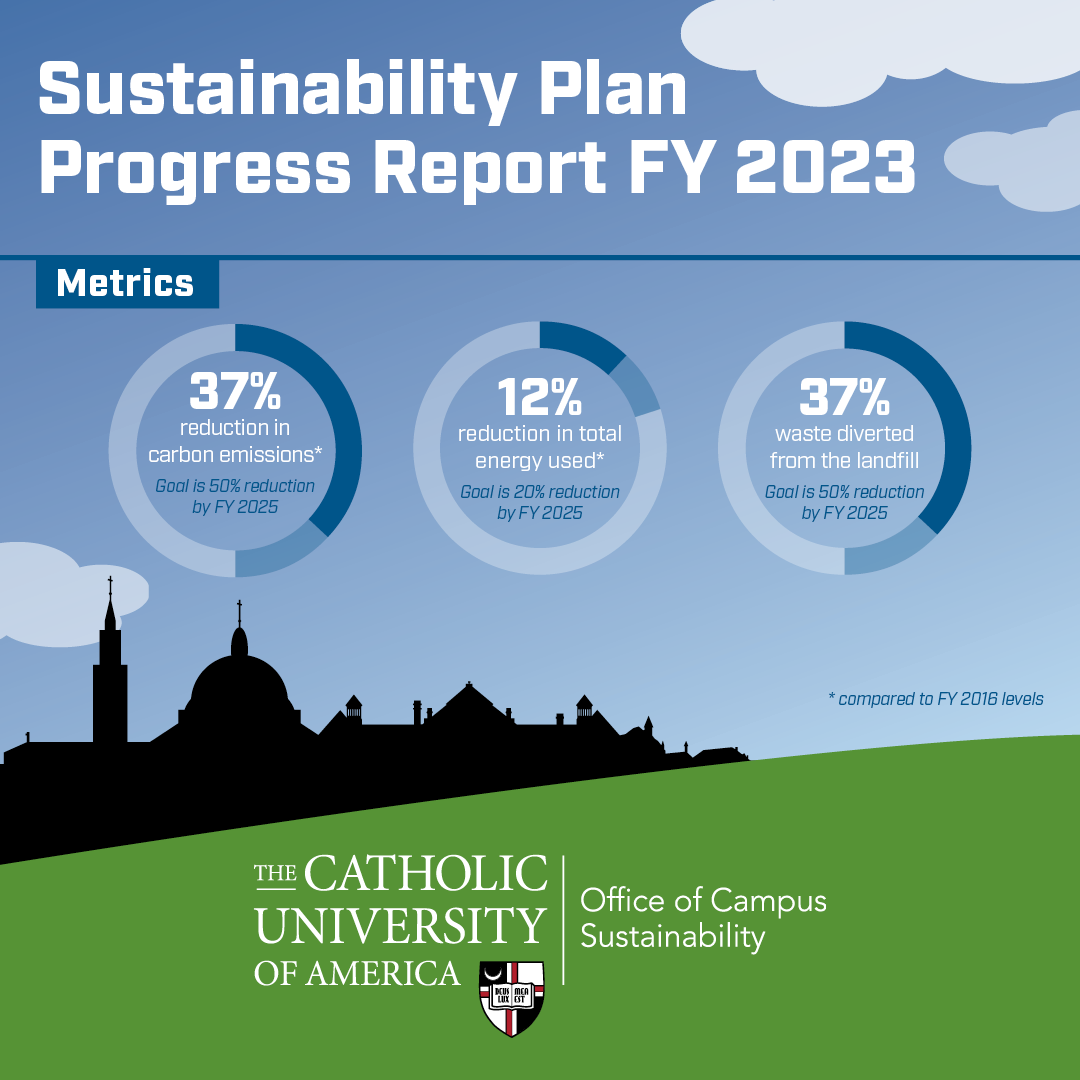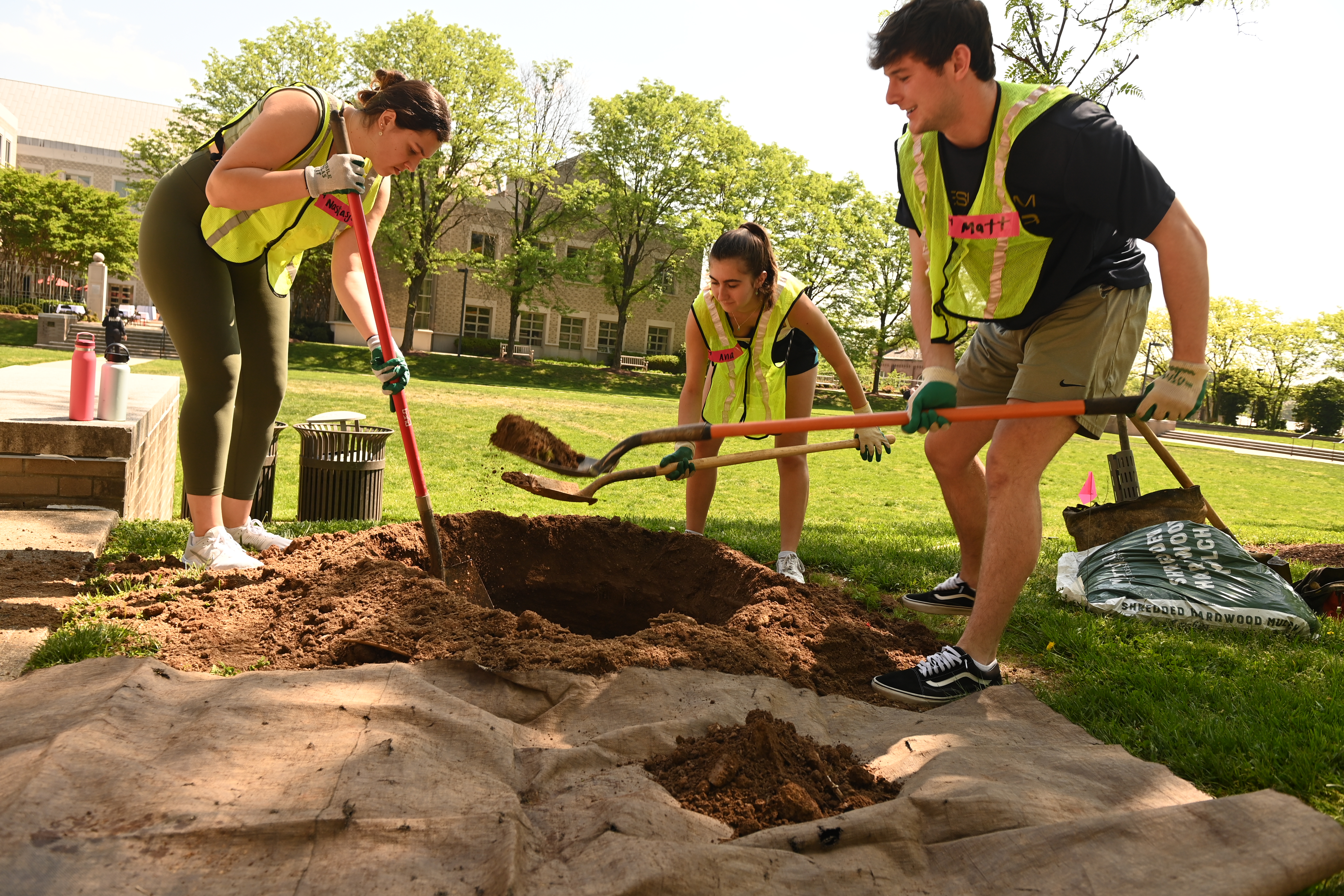The Catholic University of America is committed to advancing sustainability across our campus and beyond. Our sustainability plan outlines goals and strategies for reducing our environmental impact and promoting a more sustainable future.
This sustainability progress report highlights our accomplishments over the past year, and demonstrates how we are making progress towards our sustainability goals. We are proud to report that our carbon emissions have declined by 37% and energy usage has decreased by 12% compared to FY 2016 levels. We are also proud to have achieved a STARS Silver Rating and to have been named a Green College by the Princeton Review for the third year in a row. We made significant progress establishing a zero waste framework for campus and pursued new and exciting engagement touchpoints. FY 2023’s initiatives extended to every aspect of campus life including lecture halls, residence halls, offices, and on the field. These achievements are a reflection of Catholic University's ongoing pledge to Care for Our Common Home.
Pillar 1: Catholic Identity - Living Laudato Si'
Living Laudato Si’ goals and milestones are grounded in the University’s mission and identity as The Catholic University of America. FY 2023 initiatives included:
- Reducing carbon emissions by 37% compared to FY 2016 levels.
- Entering into a new 3-year contract to offset 100% of campus electricity use with renewable energy credits.
- Benchmarking energy, waste, and water usage for internal and external reporting commitments.
- Facilitating a Center for Teaching Excellence Connect & Collaborate series to foster conversations with faculty on improving sustainability education.
-
Connecting & Collaborating
In the Fall of 2022, the Office of Campus Sustainability (OCS) partnered with the Center for Teaching Excellence (CTE) to convene a new Connect & Collaborate series focused on the Catholic University of America's ongoing response to the call of Laudato Si. During monthly meetings facilitated by OCS’s Gabrielle Choate, National Catholic School of Social Service faculty Dr. Brooks Zitzmann, and CTE instructional coach Dr. Katryna Andrusik, faculty and staff participants explored ways to integrate sustainability into course content, improve the sustainability of classroom settings, involve more students in sustainability research, and foster interdisciplinary collaboration on sustainability topics. Through the Care for Our Common Home Connect & Collaborate series, Catholic University is advancing the conversations on sustainability across campus.
Pillar 2: Leadership and Recognition
Leadership and recognition goals and milestones are focused on benefiting Catholic University’s overall profile and visibility in the sustainability field both locally and nationally. FY 2023 initiatives included:
- Participating in the Department of Energy’s (DOE) Better Buildings Summit.
- Joining the U.S. DOE’s Higher Education Steering Committee.
- Participating in the DC Region’s CHEERS working group focused on advancing sustainability education across all campuses in the DC region.
- Collaborating with Washington, D.C.-area universities as part of the District of Columbia Mayor’s College and University Sustainability Pledge and the District of Columbia Sustainable Energy Utility’s College and University Roundtable Series.
- Pursuing LEED certification for Garvey Hall and the new nursing and sciences building.
- Updating the sustainability website to focus on ways students, staff, and faculty can get involved in sustainability on campus.
- Earning recognition by four organizations for sustainability best practices:
- STARS Silver - Association for the Advancement of Sustainability in Higher Education.
- Green College - Princeton Review.
- 10th Most Sustainable Campus in the U.S. - UI World Green Metric.
- 415th Most Sustainable Campus in the World - UI World Green Metric.
- The Master of Science in Net Zero Design program earned the U.S. Department of Energy's Zero Energy Design Designation.
-
STARS Silver
In June 2022, the Catholic University of America earned STARS Silver recognition from the Association for the Advancement of Sustainability in Higher Education. The Sustainability Tracking, Assessment & Rating System™ (STARS) is a transparent, self-reporting framework for colleges and universities to measure their sustainability performance. The comprehensive reporting framework covers everything from academics, to engagement, operations, planning, and innovation. The full Catholic University report is available online at the AASHE website.
Pillar 3: Campus Facilities and People, Planet and Prosperity
The “triple bottom line” objectives of people, planet, and prosperity drive goals and objectives related to campus facility management and high-performance best practices. FY 2023 initiatives included:
Energy
- Reducing total energy use by 12% compared to FY 2016 levels.
- Beginning construction of the 6MW West Campus Solar project.
- Completing new LED lighting and HVAC improvements at Leahy Hall and McMahon Hall.
- Achieving a 37% ongoing-consumables diversion rate.
- Piloting a front-of-house compost drop-off station.
- Rolling out a back-of-house compost program for all food waste generated in the campus kitchens.
- Adding 10 filtered-water bottle filling stations.
- Planting 145 trees across campus.
- Maintaining a year-round food pantry.
- Maintaining the campus community garden to improve community access to healthy foods.
- Designing a pedestrian pathway near Flather Hall and Observatory Walk.
-
Community Tree Planting
In April 2023, Catholic University partnered with Casey Trees, a local organization with a mission to restore, enhance, and protect the tree canopy of DC, to plant trees around campus. A dozen student and staff volunteers along with Casey Trees staff gathered on April 21st to plant 89 trees. Trees provide many benefits to our community, including reducing air pollution, providing shade and cooling, and reducing the urban heat island effect. Trees also help prevent erosion and improve water quality, which is especially important in DC where stormwater runoff can be a significant problem. By planting trees, our volunteers and Casey Trees staff contributed to the beautification of our campus as well as helped create a more livable and sustainable community for future generations. -
West Campus Solar Array
In August 2022, Catholic University broke ground on a 6-megawatt solar farm on the West Campus. With approximately one-third of the 44-acre west campus allocated to the project, the solar array is expected to play a vital role in helping the University meet the Pope's challenge of Laudato Si'. The University's partnership with Standard Solar highlights our commitment to reducing our carbon footprint and promoting clean energy. As the land was cleared for the array, Catholic University took measures to protect heritage trees and repurposed removed trees as mulch for the campus community garden and mulched pathways. This demonstrates the University's dedication to sustainable practices and utilizing available resources in innovative ways. Overall, the solar farm is a significant investment towards a more sustainable future and Catholic University's commitment to environmental stewardship.
Pillar 4: Engagement
Aligning with the Sustainability Plan’s Vision Statement, engagement initiatives involve all Catholic University stakeholders including, but not limited to, students, faculty, staff, and the greater community, and empower everyone to take steps to improve our campus environment. FY 2023 initiatives included:
- Hosting a community electronic waste recycling event in partnership with MRM that collected 300 pounds of waste.
- Leading 2 Wednesday Wellness Walks in partnership with Fitness & Recreation focused on campus trees.
- Leading 11 Earth month events.
- Growing 750 pounds of produce in the community garden and donating it to Cardinal Cupboard, the on-campus food pantry.
- Growing the Office of Campus Sustainability independent study from 5 students to 27 students across the Fall and Spring semesters and adding a Rome Campus component.
- Recovering over 100 bags of clothing and bedding and a 20-foot shipping containers’ worth of residence hall room essentials during the first green move-out donation drive in recent years.
- Adding Office of Campus Sustainability information to all staff orientation sessions.
- Leading a dozen campus sustainability and campus tree tours.
- Recovering 771 meals from Dining Services and campus events through partnerships with House of Ruth and Food Recovery US - DC.
- Opening Cardinal Closet, the free on-campus thrift store, with over 1200 donations accepted, a half dozen pop-ups in the Pryzbyla University Center, and clothing drives in partnership with the Busch School of Business and the Guadeloupe Project.
- Creating a new listserv for staff to use to swap durable office goods.
- Creating a new staff and faculty engagement opportunity at the building level called Sustainability Captains.
- Partnering with the School of Architecture and Planning to start a Recycled Materials Closet to reduce waste at the end of the semester and promote resources sharing and recycling among students.
- Installing lids on the compost bins in the Pryzbyla University Center Food Court to improve waste sorting and reduce contamination rates.
-
Earth Month 2023
During Earth Month 2023, the Catholic University community engaged in a variety of activities aimed at promoting sustainability across campus. The Ambassador of Portugal visited campus to discuss sustainability and innovation in Portugal, highlighting efforts to reduce environmental impacts. The Catholic University Orchestra performed at the Kennedy Center during the Our Blue Planet event, which celebrated Earth and its waters. The Fitness and Recreation team hosted a tour of campus trees. The University also hosted an electronics recycling event, providing an opportunity for members of the community to dispose of their electronic waste in an environmentally responsible manner. Artwork from elementary through high school students in the Brookland community was displayed at the Pryzbyla University Center, showcasing the creativity and environmental awareness of young people in the area. In addition, the community garden hosted a community day for members of the Catholic University community to work together to prepare the garden for the growing season. Finally, Cardinal Closet wrapped up its first full year of operation, having served over 300 visitors and facilitated over 1,200 clothing swaps throughout the year. These and other activities during Earth Month 2023 demonstrate the Catholic University community's commitment to promoting sustainability. -
Green Move Out Donation Drive
For the first time in recent years, Catholic University hosted a Green Move Out Donation Drive. All on-campus students were invited to donate any items that they did not want to take home with them over the summer. Students donated approximately 75 bags worth of clothing and bedding to Habitat for Humanity, plus some rugs and small appliances; three boxes of food and personal care items to Cardinal Cupboard; and approximately 30 bags worth of clothing to Cardinal Closet. In addition, students donated a full, 20-foot shipping container's worth of room supplies, including rugs, chairs, tables, organizational cubes, storage drawers, kitchen supplies, and more. These will all be offered back to students at the start of the Fall semester for free. -
Sustainability Captains
Sustainability Captains are staff and faculty members in each building on campus who serve as their building's liaison to the Office of Campus Sustainability. The goal of the Sustainability Captains program is to develop a network of sustainability leaders across campus to advance sustainability initiatives. Sustainability Captains met three times throughout the academic year to collaborate on Earth Day, Green Move-Out, and food recovery opportunities. Staff and faculty received educational messaging materials to spread the word about energy and water efficiency. In its inaugural year, 25 faculty and staff participated in the program, which represented 32 buildings and the Alexandria Center and Tucson campus.
Impact
The Sustainability Plan FY 2021-2025 challenges the University to achieve five-year outcomes. The 2016 fiscal year is used as the baseline as this was the last full year of data before the University began construction on the Energy Project. Metrics are tracked on at least a quarterly basis through utility bill analysis, sub-metering, platforms, and other data outputs. Below is a summary of the latest environmental key performance indicators.


